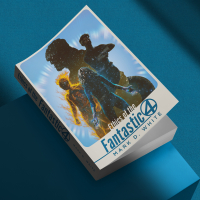 Today is the release day of my latest book, Ethics of the Fantastic Four, the fourth (natch) volume in my A Philosopher Reads… series at Ockham Publishing (even though the title does not reflect this). Unlike my recent Thor and Daredevil books, Ethics of the Fantastic Four is full-length, about 80K words, with the print version available here and the ebook available here.
Today is the release day of my latest book, Ethics of the Fantastic Four, the fourth (natch) volume in my A Philosopher Reads… series at Ockham Publishing (even though the title does not reflect this). Unlike my recent Thor and Daredevil books, Ethics of the Fantastic Four is full-length, about 80K words, with the print version available here and the ebook available here.
This has been a dream project of mine for as long as I can remember, and is the result of years of planning, re-reading, more planning, and drafting. I say "planning" twice because determining the structure of the book was definitely the most challenging part of writing it. I didn't have a single unifying idea around which to organize the book; the well-known conceptions of the Fantastic Four as being a family rather a team, and adventurers rather than traditional superheroes, are important but not sufficient to hang an entire book on. I toyed with the idea of doing a Blackwell-style collection of around twenty short essays (all written myself), collected into sections of three or four around the main characters and concepts. But when I gathered my list of proposed chapters and sorted them into sections, one or two chapters in each section stood out as most interesting, so the sections themselves turned into longer chapters focused on a central idea.
In the end, I structured the book like so:
- The first chapter introduces Reed, Sue, Johnny, and Ben, as well as the three main schools of ethics (virtue ethics, consequentialism, and deontology) that will be used throughout the book.
- Having provided an overview of the four main characters in the first chapter, the next four chapters narrow in on a specific aspect of each: Reed's outsized sense of responsibility, Sue's demonstration of several versions of strength, Johnny's issues with the danger posed by his powers, and Ben's self-loathing (especially in relation to the love of his life, Alicia Masters).
- The next chapter gets the band back together in the context of an event that draws out their various ethical perspectives: the superhero Civil War (about which I wrote before, albeit focusing on different heroes).
- Then we have a chapter about Galactus and the Silver Surfer, in which I assess the Devourer's frequent claims to be "above morality" and consider his herald's complicity in their destruction of worlds and their populations.
- Last but hardly least, there is a chapter on Doctor Doom, looking at his insecurity, vanity, and his self-description as a man of honor. (Just don't tell him his chapter didn't come first!)
Ethics of the Fantastic Four ends with the customary reading guide to the eight volumes of the main title and full references to the hundreds of comics I cite and quote throughout the book, ranging from 1961's Fantastic Four #1 to 2025's One World Under Doom #1. (The complete table of contents can be found at the dedicated page for the book, which will also keep track of any podcasts, blog posts, or any media related to the book.)
Soon, I hope to launch a new blog for the Fantastic Four, similar to The Virtues of Captain America Blog but with a broader focus. Even with a full-length book, I could not discuss or even mention all the things I find fascinating about Marvel Comics' first family and their adventures, many of which don't fit into moral philosophy, or philosophy at all. (I hesitate to even call it a philosophy blog; I envision it more as an appreciation blog by a fan who happens to be a philosopher.)
UPDATE (7-21-2025): The blog, titled Here's the Thing…, is now live.
Whether you love the Fantastic Four as much as I do or are new to their adventures, and whether you are philosophically knowledgeable or just hunger for a different perspective on superheroes, I think you'll find much in Ethics of the Fantastic Four to enjoy.
Leave a comment